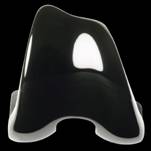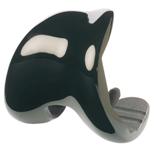Ceramic coated knee system
Total knee replacement has seen a wide spectrum of implants over the past few decades catering to a multitude of function requirements and simulating the complex anatomy of the knee. OXINIUM Oxidized Zirconium is revolutionary to the orthopaedic speciality. British company Smith & Nephew developed this new industry defining metallic alloy in response to the orthopaedic quest for implants with less wear and tear. After 11 years of development and biomechanical testing, to meet regulatory guidelines and quality control measures, the Oxinium knee implants are now available to patients in India.
What is OXINIUM™ ?
OXINIUM Oxidized Zirconium is a metal alloy consisting of 97.5% zirconium and 2.5% niobium, two of the most biocompatible metals known to man. Oxinium is formed by bringing changes to zirconium alloy metal when it is shaped into its final form. The implant is put through a process involving extreme heat and oxygenation that allows oxygen to absorb into the zirconium metal. When the surface of the metal is saturated with oxygen, it transforms from a metal to a ceramic. The ultimate product is a 5-micron thick ceramic surface on a core of metal. The ceramic is an enhanced surface that is part of the metal substrate rather than an external coating, making it very durable with unusual damage tolerance. Oxinium™ material combines the best of both metal and ceramics. It is a metal, with excellent fracture toughness like cobalt chrome, but it has a ceramic surface that offers outstanding wear resistance.
Characteristics of Ceramic coated knee • Metal with surface transformation into ceramic • Reduced polyethylene wear • Strong and durable Advantages of oxinium knee system in joint replacement |  |
| |
Wear resistance The leading problem confronting orthopaedic surgeons and manufacturers is the generation of wear debris, particularly polyethylene wear. The total knee implant can roughen over time when placed in the body. In the knee when the femoral component rubs over the plastic (polyethylene) insert, the plastic surface can start to wear out or break up. The rougher the femoral surface the worse the amount of wear. These plastic wear particles or ‘debris’ can be responsible for the failure of the whole knee replacement not only due to the thinning of the plastic insert itself but also due to the body’s reaction to the microscopic particles which can cause loosening and thinning of bone at the implant interface. The improved wear performance of Oxidized Zirconium is partly due to the ionic character of it’s ceramic surface that enhances wetability. Surfaces that attract more lubricating fluid and remain smooth tend to result in less friction. Due to this characteristic of the ceramic coating of the oxinium knee there is much lower potential for adhesive wear. With this material’s resistance to abrasion and anticipated longevity, patients under the age of 60 can once again enjoy an active lifestyle.
Biocompatibility OXINIUM Oxidized Zirconium is the best choice in joint replacement materials for patients who exhibit metal allergies. OXINIUM implants contain no detectable nickel, the main cause of negative reactions
in patients with metal allergies. Zirconium is one of the most biocompatible metals known to man; therefore, patients with metal allergies especially to nickel are able to tolerate this new implant.
Orthopaedic surgeons outside India have been using ceramic coated knee implants for over 5 years with great success. Oxinium is a superior implant that is expected to last longer and will allow active, younger patients to benefit much earlier from a replacement knee. This in turn will reduce the amount of suffering a patient often experiences due to a painful knee. Patients, who desire to return to an active lifestyle, including sports, dancing, gardening, or other strenuous activities, may also benefit from an Oxinium knee replacement. With the expected longevity of the implant ceramic coated knee implants are expected to outlive the patient! Since the oxinium implant has recently been available in India, it is a boon for younger arthritic patients who need a knee replacement.







 Aloha Dr.Bose,
My post op update:
I have had a remarkable experience as I have had no problems at all.I have been a bit Conservative with my exercises but as of last week I walk atleat two or three miles on the beach daily.I have never had pain or swelling since the surgery.
Aloha Dr.Bose,
My post op update:
I have had a remarkable experience as I have had no problems at all.I have been a bit Conservative with my exercises but as of last week I walk atleat two or three miles on the beach daily.I have never had pain or swelling since the surgery. Dr.Bose,and Mohan,
It has been almost two and a half years since I journeyed to Chennai for my Birmingham hip replacement, and for the most part things are good with my new hip joint. The experience has had a profound effect on my life. I have since cut my long hair, and am still living in Alaska and enjoying my mobility once again. In the past few years I have had a return to pain free activities.
Dr.Bose,and Mohan,
It has been almost two and a half years since I journeyed to Chennai for my Birmingham hip replacement, and for the most part things are good with my new hip joint. The experience has had a profound effect on my life. I have since cut my long hair, and am still living in Alaska and enjoying my mobility once again. In the past few years I have had a return to pain free activities.
